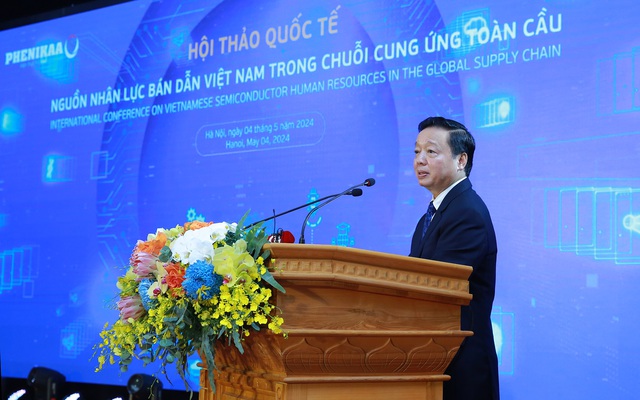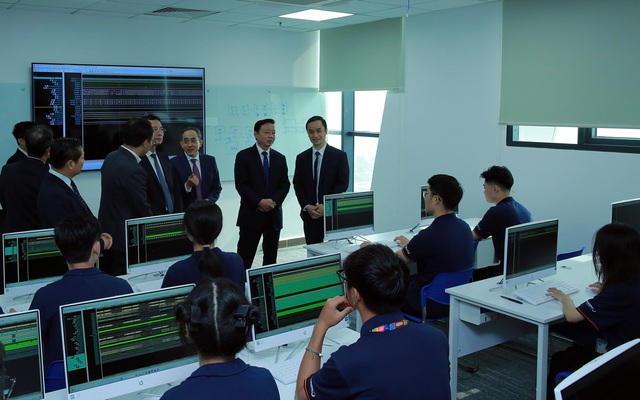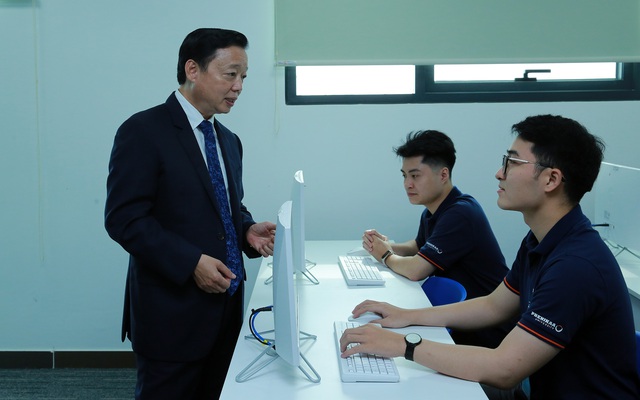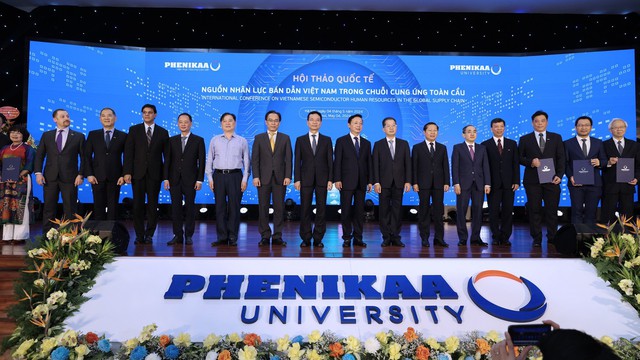
Deputy Prime Minister Tran Hong Ha: Vietnam still has a valuable resource in the form of a team of experts, leading scientists, and senior management personnel who are Vietnamese working at leading semiconductor microchip companies – Photo: VGP/Minh Khoi
Experts, scientists, managers, business representatives, and universities have discussed important issues regarding human resources for the semiconductor microchip sector in Vietnam, such as: The feasibility of training 50,000 semiconductor engineers by 2030; the supportive policies of the Government; the experiences of world-leading businesses and universities; the method of sharing and using equipment, including laboratories used for training and designing semiconductor chips; and the method of developing Vietnamese semiconductor human resources.
According to the Deputy Prime Minister, the semiconductor microchip sector is the foundation of the modern electronics industry, playing a crucial role in many current technological solutions. The energy system, transportation, information technology, computing, or the advancements in the field of artificial intelligence (AI), internet of things (IoT), big data (BigData), 5G telecommunications, supercomputers, automation, defense, security, etc. all rely on the increasingly strong development of the semiconductor microchip sector.
The semiconductor microchip industry plays an important role in shaping the development of various fields in the global economy; promoting the trend of green transition, digital transformation, and knowledge-based development worldwide. Conversely, green transition, digital transformation, and the development of the electronics industry are strong foundations for the semiconductor microchip industry.
The semiconductor chip market has maintained a fast and stable growth rate over the past 20 years, and is forecasted to become a trillion-dollar industry by 2030.
The semiconductor microchip industry is globalized. With its characteristics being the complexity of the product, requiring large investments in production, and high demands on labor qualifications, the size and processing performance determine the product’s competitiveness and the advantages of the manufacturers.
The workshop is an opportunity for the Government, ministries, sectors, localities, businesses, and pioneering training institutions in this field to listen to each other’s opinions and discuss in order to have necessary and methodical steps, while preparing a development strategy for the semiconductor microchip sector in general and the human resources of the sector in particular.

Deputy Prime Minister Tran Hong Ha visits a class at Phenikaa University’s Semiconductor Microchip Training Center – Photo: VGP/Minh Khoi
Training semiconductor microchip human resources not only for the domestic market
Referring to the 6 stages of the semiconductor microchip industry (material fabrication, chip manufacturing equipment fabrication, design tools, design, including system design and design processing), production, assembly and packaging, and testing), in which some stages are being held as exclusive rights and technologies are not transferred, the Deputy Prime Minister said that developing countries like Vietnam need to take steps, and have a thorough and careful understanding, in order to have a reasonable and effective approach, and participate more deeply in all stages of the semiconductor microchip sector. That requires a well-prepared human resource training strategy with different investment and quality requirements.
“Each country has its own strategy to develop products and product groups in the semiconductor industry ecosystem based on its own strengths,” the Deputy Prime Minister raised the issue and said that along with the domestic human resources, Vietnam still has a valuable resource in the form of a team of experts, leading scientists, and senior management personnel who are Vietnamese working at leading semiconductor microchip companies worldwide.
“In the trend of shifting regional and global production chains, training human resources for the semiconductor microchip sector not only serves the development strategy of the semiconductor industry and the demands of businesses in Vietnam but also needs to be included in the overall equation of the semiconductor microchip sector and the global electronics industry,” noted the Deputy Prime Minister.

Deputy Prime Minister Tran Hong Ha talks to a student studying semiconductor microchip design at Phenikaa University – Photo: VGP/Minh Khoi
Solving the ‘equation’ of quickly developing a high-quality human resource team with specialized expertise
The Deputy Prime Minister affirmed that Vietnam is fully aware of the role and importance of the semiconductor industry and is currently facing a great opportunity to become a strategic destination in the global supply chain of the semiconductor industry.
Vietnam currently has a comprehensive strategic partnership with most countries with developed semiconductor industries. In the Vietnam – US Comprehensive Strategic Partnership, the two sides particularly emphasized that the breakthrough cooperation is innovation and high technology; Vietnam has signed a Memorandum of Understanding on cooperation with the US on developing the semiconductor industry ecosystem within the framework of President Joe Biden’s visit in September 2023.
Recently, leading semiconductor microchip manufacturing corporations (NVIDIA, Intel, Samsung, Synopsys, etc.) have made many visits and worked to affirm their interest, cooperation, promote research, explore investment opportunities, and develop, towards building semiconductor manufacturing centers in Vietnam.
“We need to recognize and solve the problem of ‘positioning’ and ‘shifting’ of the global semiconductor industry development race with specific equations in the shortest and fastest time, in which, human resources will determine success or failure,” said the Deputy Prime Minister, adding that the policies, orientations, viewpoints, goals, and guidelines of the Party and State on the semiconductor industry need to go hand in hand with the roadmap, tasks, implementation solutions, and clear division of labor.
The Deputy Prime Minister clearly stated that quickly building a high-quality human resource team with specialized expertise in semiconductor microchips is the key, the opportunity, and also the biggest challenge for Vietnam to make the best use of its potential and advantages. Each stage of the semiconductor microchip sector needs to forecast and assess the human resource demands of the domestic and global markets, as well as the development trends of the electronics industries.
Emphasizing the close relationship between the semiconductor industry and basic research, implementation, technology transfer, and production application, the Deputy Prime Minister hopes that managers, diplomatic organizations, training units, domestic and international organizations, and businesses will exchange, discuss, contribute, and propose solutions on trends, opportunities, and solutions so that Vietnam can solve the “equation” of quickly building a high-quality human resource team with specialized expertise in semiconductor microchips. “What does the Government need to do together with businesses to determine a human resource training strategy for the semiconductor microchip sector with a solid scientific and practical foundation?” said the Deputy Prime Minister.

Deputy Prime Minister Tran Hong Ha and delegates attending the workshop – Photo: VGP/MK












